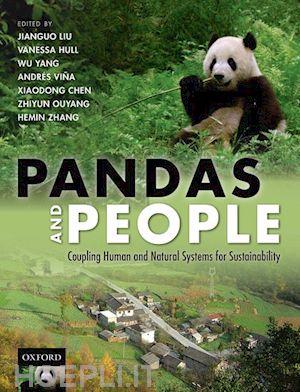Dr. Jianguo (Jack) Liu is Rachel Carson Chair in Sustainability and University Distinguished Professor in the Department of Fisheries and Wildlife as well as Director of the Center for Systems Integration and Sustainability at Michigan State University (MSU). He is also a guess professor in the Chinese Academy of Sciences. His major research interests include coupled human and natural systems, telecoupling, conservation ecology, and integration of ecology with social sciences and policy for understanding and achieving sustainability. His work has been published in journals such as Science and Nature, and featured in the global news media. Vanessa Hull is a postdoctoral researcher at the Center for Systems Integration and Sustainability (CSIS) at Michigan State University. Her research interests include animal behavior and ecology, landscape ecology, and conservation biology. She received her PhD in Fisheries and Wildlife from Michigan State University in 2014. Her work has been published in journals such as Biological Conservation, Ecology and Society, and Science, and has been widely featured in the news media. She has also previously co-edited a book "Sources, Sinks, and Sustainability" (2011, Cambridge University Press). Dr. Wu Yang is an Associate Scientist and Manager of Monitoring & Evaluation at Conservation International, Arlington, Virginia. He is interested in quantifying and understanding the interactions among policy interventions, natural capital, and human well-being. He received a dual PhD in Environmental Science and Policy and Fisheries and Wildlife from Michigan State University in 2013. His work has been published in journals such as Science, PNAS, and Ecological Economics, has been featured by Science magazine as "Editors' Choice ", has been highlighted by NSF's website Science 360 as "Breaking Story ", has been selected by Elsevier as the Top 25 Hottest Articles in Ecological Economics, and has been widely covered by international news media. Dr. Andrés Viña is an Assistant Professor at the Center for Systems Integration and Sustainability (CSIS) at Michigan State University. Dr. Viña's research is mainly focused on the use of data collected by optical sensors operating at both close (e.g., handheld spectroradiometers) and remote (e.g., sensors on aircraft and spacecraft) distances to analyze the spatio-temporal dynamics of vegetation. He received his PhD in Natural Resources from the University of Nebraska-Lincoln in 2004. His work has been widely published in journals such as Ambio, Biological Conservation, Ecological Indicators, Ecological Applications and Remote Sensing of Environment and has been widely featured in the news media. Dr. Xiaodong Chen is an Assistant Professor, Department of Geography and Curriculum for the Environment & Ecology, University of North Carolina at Chapel Hill. He is interested in studying how human activities affect the natural environment, how human livelihood may be changed due to changes in environmental conditions, what are complex interactions among components in human and natural systems, and how human-environment interactions are influenced by policies. He received a PhD in Fisheries and Wildlife from Michigan State University in 2010. His work has been published in journals such as PNAS, Ambio, Conservation Biology, and Ecological Modelling, and has been widely covered by international news media. Dr. Zhiyun Ouyang is Professor and Director of the State Key Laboratory of Regional and Urban Ecology, Research Center for Eco-Environmental Sciences, Chinese Academy of Sciences. He studies ecosystem services, ecosystem assessment and ecological planning, biodiversity conservation, and GIS applications in ecology and environmental research. His work has been published in journals such as Science, Nature, and PNAS. He is also a key advisor to the Chinese government who participates in national-level planning on environmental issues such as ecosystem service protection policies and nature reserve management. Professor Hemin Zhang is Director of Wolong Nature Reserve. His research interests center on captive breeding and management, animal reintroduction, human-wildlife interactions, and nature reserve management. He is currently overseeing the reconstruction of the Wolong Nature Reserve after the devastating 2008 earthquake in China. Zhang's research is published in journals such as Science and Conservation Biology, and has been widely featured in the global news outlets.











